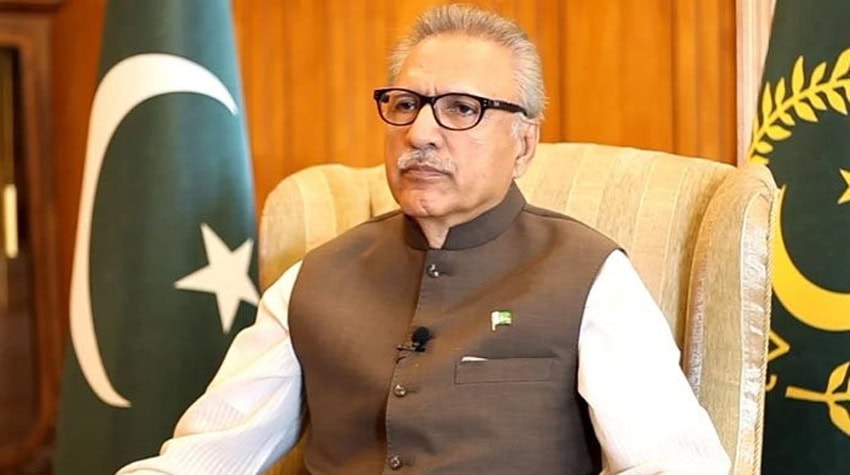Says presidential system was not solution to country’s woes
President Dr Arif Alvi on Tuesday said that in his opinion there was “no harm” in appointing the next army chief before the expiry of the incumbent’s term.
Chief of Army Staff Gen Qamar Javed Bajwa, who was given an extension by the PTI government in 2019, will leave his position on November 29 when his second three-year tenure comes to an end.
The next army chief’s appointment is at times mentioned as one of the subplots in the ongoing political crisis engulfing the country.
During an interaction with journalists in Islamabad, President Alvi was asked about his thoughts on the possibility of the appointment being made ahead of time, to which he indicated he would not object to any such moves.
“In my opinion, there is no harm in making the army chief’s appointment ahead of time,” he said.
On a question about whether the army could play a role amid the current political quagmire in the country, he said: “There is no constitutional role for the army in the country [for resolving political crises].”
Further questioned about the political situation in the country, he said he did not have the authority to tell anyone to engage or hold a dialogue. However, he did say that “the President House is ready to play its role [for reconciliation] if all parties agree.”
Alvi said the presidential system was not the solution to the country’s woes as he put his faith in the existing parliamentary system.
The president denied violating the Constitution or betraying the country, but acknowledged that the proceedings under Article 6 of the Constitution should definitely be initiated against traitors.
Referring to the cablegate crisis, Alvi said he believed that a “clear mandate” for governance was very important and the results of any investigation on the diplomatic cable should be brought before the public.
President Alvi rubbished the perception that his relations with Prime Minister Shehbaz Sharif were not cordial, saying that such an impression was “wrong”.
He said he had received 74 summaries from the incumbent government, of which he had signed and sent back 69.
Alvi said he had held back summaries relating to the Punjab governor, overseas voting rights, electronic voting machines and changes in the National Accountability Bureau’s laws.
He said he had not discussed the changes in the NAB or EVM laws with PTI Chairman Imran Khan and his last correspondence with him was on the issue of Punjab’s governor.
The president also acknowledged the efforts of Foreign Minister Bilawal Bhutto Zardari to improve relations with the United States.
“The neutrals need to remain neutral always,” the president said. “The elephant in the room has not appeared now, it has been there for 50 years,” he said, adding that the matter is a ground reality and that it can be solved through dialogue.
“I forwarded the reference pertaining to Justice Isa that was sent to me,” the president said. He said that a person should change their views if the time and circumstances change.
The president said that Article 6 should be applied to who ever commits treason.
“If anyone believes that I have violated the Constitution then they may try me under Article 6 but neither have I violated the Constitution nor suspended it,” the president said.
“I personally think that a clear mandate is extremely important no matter what the time is,” President Alvi said. Responding to a question about the foreign “threat” letter, Alvi said that the matter should be made public if it has been investigated.
The president said that the United States does not want to end relations with Pakistan.
The President said that as uncertain political and economic situation in any country can expand polarization in society which was detrimental to everyone’s interest, therefore, all stakeholders should take meaningful steps to bring about political and economic stability through a consultative process while remaining within the bounds of the Constitution and relevant laws of the country.
He said that all pillars of the state and institutions should play their constitutional role while remaining within the bounds of law for holding free and fair elections, whenever held, to pave the path for the setting up a government which truly reflected the aspirations and hopes of the people of Pakistan.
“Only a government that comes to power through transparent, free and fair elections can provide much-needed political, financial and economic stability to the country”, he said.
Replying to a question, he said that he believed in making the right decisions without any fear and favour. said he did not have the authority to tell anyone to engage or hold a dialogue. However, he did say that “the President House is ready to play its role [for reconciliation] if all parties agree.”
Alvi said the presidential system was not the solution to the country’s woes as he put his faith in the existing parliamentary system. The president denied violating the Constitution or betraying the country, but acknowledged that the proceedings under Article 6 of the Constitution should definitely be initiated against traitors. Referring to the cablegate crisis, Alvi said he believed that a “clear mandate” for governance was very important and the results of any investigation on the diplomatic cable should be brought before the public.










